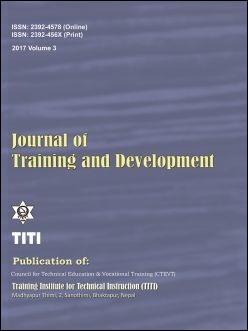Role of Capacity/Skill Development Trainings in Rural Livelihood: A Case Study of Hapur, Dang
DOI:
https://doi.org/10.3126/jtd.v3i0.18229Keywords:
Capacity development training, skill development training and rural livelihood.Abstract
Education has transformative potential if it is connected to people’s life and their livelihood. And education has been seen as a means of developing capabilities, promoting employment potentials, and reducing poverty in rural communities. Reflecting upon those ideas, this study explained transformative role of capacity/skill development training on livelihood in rural contexts. There is no doubt, capable, knowledgeable and skillful youths have been playing change agent role especially in local levels. The study applied quantitative case study research methodology to test the significant relationship between study variables. Questionnaires, and key informant interview techniques were applied while collecting data information. Set of questionnaires were filled up with 108 respondents selected by using stratified random sampling methods. The study found significant role of capacity/skill development trainings on rural livelihoods. Further, skilled and capable youths are becoming human capital in the society and working for transforming social capital. They are also generating household economy by involving in income generate activities. The study concluded that capacity/skill development training program conducting in local level help to nourish knowledge, ability and develop vocational skills of male and female youths. And they are now playing transformative role in the society and achieving rural prosperity. Therefore, findings of the study can become fruitful guidelines to the policy makers and planners in local levels.
Downloads
Downloads
Published
How to Cite
Issue
Section
License
Authors who publish with this journal agree to the following terms:
- Authors retain copyright and grant the journal right of first publication with the work simultaneously licensed under a Creative Commons Attribution License that allows others to share the work with an acknowledgement of the work's authorship and initial publication in this journal.
- Authors are able to enter into separate, additional contractual arrangements for the non-exclusive distribution of the journal's published version of the work (e.g., post it to an institutional repository or publish it in a book), with an acknowledgement of its initial publication in this journal.
- Authors are permitted and encouraged to post their work online (e.g., in institutional repositories or on their website) prior to and during the submission process, as it can lead to productive exchanges, as well as earlier and greater citation of published work (See The Effect of Open Access).




